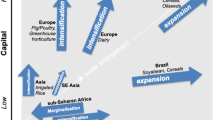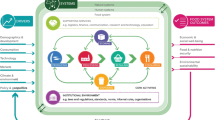Abstract
This article reflects on the relative silence of African farmers within debates around the potential for genetically modified (GM) crops to transform agriculture on the continent. It proposes two strategies for amplifying these voices—one focused on research methodologies, the other on outreach—in order to transform the conversation around GM’s potential in Africa into one that revolves around farmer preferences and priorities.
Similar content being viewed by others
Notes
Funding for this research was generously provided through the John Templeton Foundation Grant #28469 ‘Can Genetically Modified crops help African farmers? Investigating attitudes and intentions to adopt GM matooke banana in Uganda’.
Yields are represented by accompanying size of bunches that range from small to large. The specific yields for Variety X and Variety Y depend on the particular variable under investigation, though all depict Variety Y (simulating the GM variety) as having a larger yield than Variety X (simulating the conventional variety).
References
Bellon, M.R. 1996. The Dynamics of Crop Infraspecific Diversity: A Conceptual Framework at the Farmer Level. Economic Botany 50: 26–39.
Bellon, M.R., and J. Reeves. 2002. Quantitative analysis of data from participatory methods. Mexico City: CIMMYT.
Brush, S.B. 2004. Farmers’ bounty: Locating crop diversity in the contemporary world. New Haven: Yale University Press.
Ceccarelli, S., and S. Grando. 2007. Decentralized participatory plant breeding: An example of demand driven research. Euphytica 155: 349–360.
Cleveland, D., and D. Soleri. 2005. Rethinking the risk management process for genetically engineered crop varieties in small-scale, traditionally based agriculture. Ecology and Society 10: 1–33.
de Groote, H., S. Mugo, D. Bergvinson, and B. Odhiambo. 2004. Debunking the myths of GM crops for Africa:The case of Bt maize in Kenya. In Annual Meetings of the American Agricultural Economics Association. Denver, Colorado.
Edmeades, S., and M. Smale. 2006. A trait-based model of the potential demand for a genetically engineered food crop in a developing country. Agricultural Economics 35: 351–361.
Elbehri, A., and S. MacDonald. 2004. Estimating the impact of transgenic Bt cotton on West and Central Africa: A general equilirium approach. World Development 32: 2049–2064.
Ezezika, O.C., A.S. Daar, K. Barber, J. Mabeya, F. Thomas, J. Deadman, D. Wang, and P.A. Singer. 2012. Factors influencing agbiotech adoption and development in sub-Saharan Africa. Nature Biotechnology 30(1): 38–40.
Graff, G., D. Roland-Holst, and D. Zilberman. 2006. Agricultural biotechnology and poverty reduction in low-income countries. World Development 34(8): 1430–1445.
Horna, D., P. Zambrano, J. Falck-Zepeda, T. Sengooba, G. Gruere, M. Kyotalimye, and E. Schiffer. 2009. Assessing the potential impact of genetically modified cotton in Uganda. Kampala: Program for Biosafety Systems.
James, C. 2012. Global Status of Commercialized Biotech/GM crops. Ithaca: ISAAA.
Kikulwe, E.M., E. Birol, J. Wesseler, and J. Falck-Zepeda. 2011a. A latent class approach to investigating demand for genetically modified banana in Uganda. Agricultural Economics 42: 547–560.
Kikulwe, E.M., J. Wesseler, and J. Falck-Zepeda. 2011b. Attitudes, perceptions, and trust. Insights from a consumer survey regarding genetically modified banana in Uganda. Appetite 57: 401–413.
Lewis, C. P., Newell, J. N., Herron, C. M., and Nawabu, H. .2010. Tanzanian farmers’ knowledge and attitudes to GM biotechnology and the potential use of GM crops to provide improved levels of food security. A Qualitative Study. Bmc Public Health, 10.
Republic of Uganda. 2010. National Development Plan (2010/11–2014/15). Kampala: Government of Uganda.
Schnurr, M.A. 2013. Bio-hegemony and biotechnology in Uganda: Unraveling the strategies used to promote Genetically Modified crops into new African market. Journal of Peasant Studies 40(4): 639–658.
Smale, M., and W.K. Tushemereirwe. 2007. An economic assessment of banana genetic improvement and innovation in the Lake Victoria region of Uganda and Tanzania. Washington, D.C.: International Food Policy Research Institute.
Smale, M., P. Zambrano, G. Gruere, J. Falck-Zepeda, I. Matuschke, D. Horna, L. Nagarajan, I. Yerramareddy, and H. Jones. 2009. Measuing the economic impacts of transgenic crops in developing agriculture during the first decade: Approaches, findings, and future directions. Washington, D.C.: International Food Policy Research Institute.
Soleri, D., D.A. Cleveland, F.C. Aragon, M.R. Fuentes, H.L. Rios, and S.H. Sweeney. 2005. Understanding the potential impact of transgenic crops in traditional agriculture: Maize farmers’ perspectives in Cuba, Guatemala and Mexico. Environmental Biosafety Research 4: 141–166.
Soleri, D., D.A. Cleveland, G. Glasgow, S.H. Sweeney, F.A. Cuevas, M.R. Fuentes, and R.L. Humberto. 2008. Testing assumptions underlying economic research on transgenic food crops for third world farmers: Evidence from Cuba, Guatemala and Mexico. Ecological Economics 67: 667–682.
Thompson, J., and I. Scoones. 2009. Addressing the dynamics of Agri-Food systems: An emerging agenda for Social science research. Environmental Science & Policy 12: 386–397.
Veteto, J.R., and K. Skarbo. 2009. Sowing the seeds: Anthropological contributions to agrobiodiversity Studies. Culture and Anthropology 31: 73–87.
Vitale, J., H. Glick, J. Greenplate, M. Abdennadher, and O. Traore. 2008. Second-generation Bt cotton field trials in Burkina Faso: Analyzing the potential benefits to West African farmers. Crop Science 48: 1958–1966.
Witcombe, J.R., K.D. Joshi, S. Gyawali, A.M. Musa, C. Johansen, D.S. Virk, and B.R. Sthapit. 2005. Participatory plant breeding is better described as highly client-oriented plant breeding. I. Four indicatiors of client-orientation in plant breeding. Experimental Agriculture 41: 299–319.
Author information
Authors and Affiliations
Corresponding author
Additional information
The quote in the title comes from a scientist interviewed on June 12, 2010.
Rights and permissions
About this article
Cite this article
Schnurr, M.A., Mujabi-Mujuzi, S. “No one asks for a meal they’ve never eaten.” Or, do African farmers want genetically modified crops?. Agric Hum Values 31, 643–648 (2014). https://doi.org/10.1007/s10460-014-9537-z
Accepted:
Published:
Issue Date:
DOI: https://doi.org/10.1007/s10460-014-9537-z




